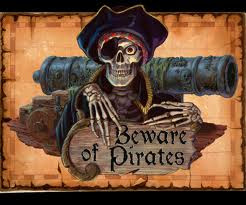This is an article I wrote for BoLS that generated quite a bit of discussion, and I wanted to bring it over to Frontline and see what our reader base had to say on the subject.
Piracy. It’s a topic we’re all familiar with. From music to movies to miniatures, there’s always someone willing to sell something that “fell off the back of a truck.”
With the advent of the internet, the pirate’s bay, so to speak, has grown substantially. Recasting miniatures is nothing new, but what we have seen recently is an influx of new bad actors in the market who seem to not only be more organized but have a much larger capacity. I am sure most everyone reading this article is familiar with a certain Chinese company that has been ripping Forgeworld off blatantly, or the Russian and Eastern European companies operating via eBay and other online vendors. The thing is, most of these have been individuals in the past with limited means to produce. Some of these new companies though, have actual manufacturing capabilities that rival the companies they are ripping off.
The bottom line is that it is stealing. I think we all know that, but many folks just don’t care and purchase anyway because it’s so cheap. So what is the ethical gamer to do? We all know our hobby is expensive, but does that justify buying stolen goods? From a strictly moral stand point, no, it does not. Stealing is inherently wrong and if enough people buy the knock-off and not the original, the original disappears.
However, on the flip side of the dilemma is the implicit knowledge that these companies could actually charge substantially lower prices for their wares and still turn a profit. Perhaps not enough profit to run their businesses the way they do now, but it does present some interesting data.
I could easily understand how a cash strapped gamer, angry at yet another price hike from their favorite game company, decides to buy the knock-off and save some money. It isn’t right, I don’t think anyone will argue that, but could you argue that it is justified? All companies have a right to defend their intellectual property, and they certainly have the right to charge what the market will bear, but is there a point where those prices make many “justify” the purchase of pirated goods?
It is a difficult ethical question. I know that if I were to live in Australia, for example, where certain products are literally double what they are in the USA, the temptation would be much stronger for many, as the savings are so dramatic. It is the same question many people face when deciding to purchase online or from their FLGS. On the one hand you save money, on the other you support your local store which is where you actually play the games, make new friends and where new hobbyists are recruited.
Ultimately it is a tough problem. We’ve seen that no foreign country can easily force China from conducting business the way they do, at least no time soon and the “wild west” of many eastern European companies continues to offer easy safe havens for bad actors. So I doubt the Pirates are going anywhere anytime soon. With the internet and increased global connectivity, if anything it will only get worse. Perhaps then, the last option to the companies trying to combat this problem is to take away the one advantage the imitator has: the cost. Pirating bargain goods is not a particularly lucrative enterprise.
By lowering prices enough to make purchasing a knock-off a less desirable prospect, they would be able to recapture that lost business and perhaps increase revenue through volume. I think it would also go a long way to mollifying many of the gamers out there who have grown increasingly angry at what many see as ever-spiraling prices.
Perhaps I am wrong and perhaps we will see a PIPA or SOPA like era in internet economics that will stifle this. I hope not, as in my eyes, liberty and freedom are no price to pay to retain any company’s margins. I can only hope that the game companies of the world will see the value in working with their customer base instead of against them and drive the imitators out of the game through producing a better, and reasonably priced product. I can understand that they may not see it this way, and feel that they are being robbed (which they are), but in the end the wiser move may be to try different tactics.
What does the community feel about this topic?





I live in Australia and have played 40k since 2nd edition and I have bought and paid for more than my share of armies over the years. I used to save my money to pay the prices GW asked for many years without flinching. Then one day the internet showed me that I could buy the same product fro a different country for half the price I pay here. GW then cut off “the rest of the world” from buying from these companies.
I no longer buy GW products from retail stores as the only place that sells it has closed down in my area and the next town is 1500km away (I live in central Australia). All my purchases have to be made online so I use ebay and other means to aquire the miniatures I want. I would buy from GW if they could match the prices that I pay from other countries.
Even though I am not willing to pay twice as much for my hobby than others around the world, I would never buy pirated copies of my hobby. I dont like what GW has done to us down under, but I dont want the company that provides me with the games that I enjoy to stop making new minis or rules for me to sate my hobby needs.
I guess what I am trying to say is, I made the choice to start this hobby and I have the right to spend my money where I want, but if I want to play these games in the future I need to support the company that produces my hobby.
I agree that it is important to support the makers of a product. But I can also understand that some people just can’t stomach paying exorbitant prices. It is admirable that you choose to do what is in the best interest of the long term health of the hobby.
While I agree it is to a certain extent stealing, I believe it is healthy to the environment of business in the sense that it creates competition in an otherwise monopolized environment.
While the price of the knock offs or what have you are substantially lower, you could in turn see prices dropping from the official manufacturer as well as free advertisement for a product that would otherwise not have any face time with a customer outside of their online shopping cart.
A perfect example came this past month while at a GT. A gentleman had 3 Comtemptor Dreadnoughts and my buddy was instantly in love with them. While they were not the real deal, my buddy was ecstatic and placed an order for 3 from Forgeworld that weekend. He had been hesitant due to him not seeing them in real life and wanted a better idea of their scale. After seeing the knock offs he was sold.
I hope they don’t stifle these guys as they are actually helping those businesses more than they are hurting them.
I agree that competition is important to maintaining a healthy marketplace. I think it is better for all of us, and GW, to have competition and be forced to fight for customers. The reason they developed a crappy reputation in years past was because they didn’t think they needed to work harder to earn customers. Now they do. I’m interested to see what happens.
When you are on the GW website go down the bottom and change the country to Australia, watch the prices DOUBLE and then you see why people buy pirate models. How can they justify double the price…
I agree 100%. It is price gouging.
I basically give a big middle finger to GW. They are constantly raising the price, providing a lower percentage of models per release, and posting greater profits. They complain that they are switching materials from metal to resin because of the cost factor, then turn around and make Fine cast cost more than the metal models. Not only that, but they continue to use the same molds that the metal was poured into.
They are pricing me out of the hobby. I look for any edge I can to save money. If GW falls because of the piracy of their products, well….. I will just play something else.
I don’t believe that this puts a serious dent into their profits though. They have been saying that piracy would kill off the video game industry since the late 90’s. Its crap. Games are more expensive now, and the profit margins are up, not down, even though piracy of games has increased.
These companies have got to wake up and realize that it is a supply and demand world. If you choke the supply because of prices, someone will come in and meet the demand for lower prices. Legal or not.
Yup. I agree. It is simple economics, and if you raise your prices too much, expect someone to come in and do things cheaper.
Reese
At least here in the United States freedom of expression is a free right (paid for in the blood of fellow American soldiers).
I will continue to protect and defend this liberty if needs be with my life.
It seems to me that copyright law is an abridgment of the freedom of speech, or of the (injection plastic) press.
Abridge: to reduce in scope to shorten by omission (Webster’s)
I agree. Freedom and liberty is what this country is meant to be about. I would hate to see us lose that.
But as for this topic specifically, I think the Piracy may actually be good as it forces companies, at least partially, to realize that they can’t jack their prices through the roof without consequence.
I see both sides of this. If we don’t support the company then the games suffers or vanishes all together over time. However, with their prices hikes they are quickly pricing to many people out of the game and If I can’t pull in new blood (something I work very hard at) because of their prices, then eventually even I will quit buying stuff and have to find a new game that others will play too.
True. It is aggravating to see price hike after price hike when other companies out there produce much less expensive miniatures at quality levels that rival GW.
If someone designed models similar to GWs, just make them 50% gw product or more. They stall on a ,lot of items that should be released with the codex but production is lacking in GWs model department. Every codex that has been released recently has had models released in waves instead of all at once, and some figures have never been seen and still must be converted.
Very true. I think they space it out to maximize sales on each release.